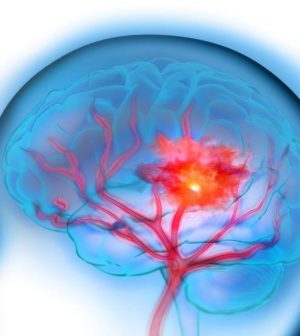- Could Your Grocery Store Meat Be Causing Recurring UTIs?
- Are You Making This Expensive Thermostat Error This Winter?
- Recognizing the Signs of Hypothyroidism
- 10 Strategies to Overcome Insomnia
- Could Artificial Sweeteners Be Aging the Brain Faster?
- Techniques for Soothing Your Nervous System
- Does the Water in Your House Smell Funny? Here’s Why
- Can a Daily Dose of Apple Cider Vinegar Actually Aid Weight Loss?
- 6 Health Beverages That Can Actually Spike Your Blood Sugar
- Treatment Options for Social Anxiety Disorder
Adding Blood Thinners to Clot-Busting Meds Won’t Improve Stroke Outcomes: Study

Adding blood thinners to clot-busting drugs does not improve outcomes for stroke patients, a new study claims.
Doctors had hoped that combining the two types of medications would improve treatment of stroke, as a similar combination has shown promise in treating heart attacks, the researchers said.
But they halted a clinical trial looking into the combo for stroke treatment after finding no apparent benefit for the first 500 participants out of the planned 1,200-patient study.
The findings were presented Wednesday at the American Stroke Association’s annual meeting in Phoenix.
“When we began the trial, we believed the medications would improve outcomes, so we were surprised with the negative results,” said lead researcher Dr. Opeolu Adeoye, chair of emergency medicine at Washington University’s School of Medicine in St. Louis.
The clinical trial involved 57 different stroke centers throughout the United States.
All patients received a standard clot-busting drug within three hours of their stroke. They then were randomized to receive one of two blood thinners or a placebo drip of saline.
Clot-busting drugs activate an enzyme that breaks up a blood clot, while blood thinners inhibit the action of clotting factors in the blood.
“We designed the trial to allow us to efficiently answer the question for two blood-thinning medications in one trial,” Adeoye said in a meeting news release.
Results did show that the combination was safe, and it did not increase the risk of brain bleeding.
Unfortunately, three months after treatment those patients that received the combo weren’t doing any better than patients who only got a clot buster, researchers said.
Patients taking the blood thinner argatroban averaged 5.2 on a 10-point disability scale, and those who got the blood thinner eptifibatide averaged 6.3.
In comparison, those who got a clot buster alone averaged 6.8 on the disability scale, indicating they got the best benefit from their overall treatment.
Researchers said studies are underway to determine whether blood thinners could help prior to surgery to remove a stroke-related blood clot, if the thinners are delivered directly to the affected artery.
Because this research was presented at a medical meeting, it should be considered preliminary until published in a peer-reviewed journal.
More information
The Cleveland Clinic has more about clot-busting drugs.
SOURCE: American Stroke Association, news release, Feb. 7, 2024
Source: HealthDay
Copyright © 2026 HealthDay. All rights reserved.










